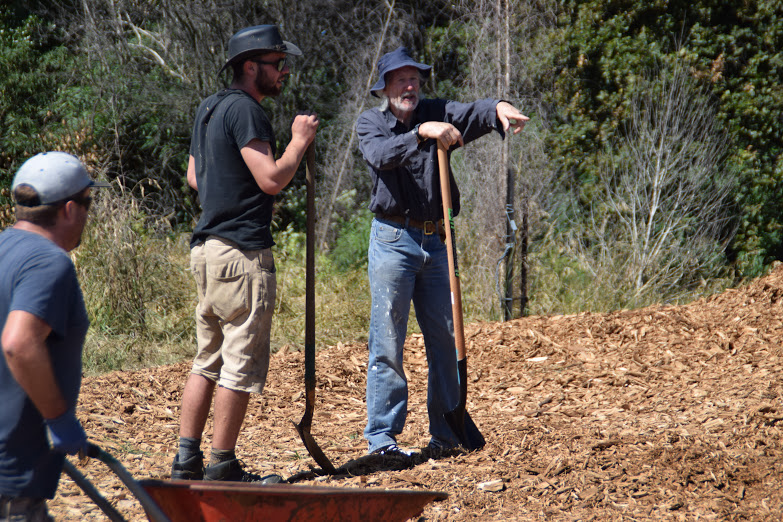Lincoln SOLA's Mike Barthelmeh to retire
Lincoln’s School of Landscape Architecture is losing two of its longest serving champions, as Mike Barthelmeh and Simon Swaffield retire after thirty-plus years shaping landscape architects of the future. Next week we’ll hear from Simon Swaffield, but today it’s all about Mike Barthelmeh.
Mike began at Lincoln (then College) as an eager student in 1968, doing a four year horticultural science degree. Then in 1972 he began a diploma in landscape architecture, part of the third intake at the new School of Landscape Architecture, along with the likes of Di Menzies, Peter Rough and Di Lucas. “Crikey, yeah, in those days it was sort of pieces of slate and chisels,” he laughs. “There were eight of us in that first year. We were in little prefab buildings beside the swimming pool about where the school is located now.”
Mike Barthelmeh with students at SOLA.
Back then students relied on classic text books by one of the original modernist landscape architects, John O Simonds, and by Dame Sylvia Crowe, a pioneer in the profession in terms of ideas around sustainability and working with nature. “We relied quite heavily on that information and news for what was happening, where the profession was heading. In those days landscape architects really were generalists. There weren’t many of us around. You were responsible for planning and design and management and the whole gamut of things.”
His study complete - temporarily at least - Mike headed to Australia to work as a garden supervisor in the Botanic Gardens in Canberra for a couple of years. He made his way overland to London, taking about a year, including time in India, Afghanistan and Iran before returning to New Zealand. In 1986 SOLA came calling, inviting him to take up a tutoring role. “I was attracted by the creativity and energy of the students,” he says. “You don’t know what you know until you start trying to explain it to someone. The students seemed to appreciate the learning and I found it rewarding.”
Mike's travels took him to Afghanistan.
Those students quickly learnt that lectures began with a story or tracks from an eclectic mix of music (blues, 70s rock, polyphonic medieval music, or Bach) “just to push their own thinking, to lift those boundaries and blinkers from their eyes.” And there was always room for humour in class - “no point in taking things too seriously.”
Mike says the basics of good landscape architecture haven’t changed over the years. “Good spatial resolution and ensuring the cultural and social content has been considered as part of the design process. And thinking about landscape systems. We are involved often in site-based design but we’re part of a whole series of landscape systems, and being aware of those systems as you make any process changes or interventions is really important.”
Another of Mike's photos from Afghanistan - these are the travertine walled lakes at Band-e Amir in Afghanistan's Bamyan Province.
He says the environmental science roots have always been very strong in SOLA’s programme, which is one of the reasons he believes the school is so successful. “To have science underpinning the discipline is crucial.”
He cites his biggest career achievement as inspiring students to be curious about their world, what makes it tick and what they can do within it. “There’s been quite a bit written about design and meaning in landscape; you can't design meaning but you can certainly design for meaning to be accessed or interpreted by those who are using or observing or are participants in that landscape. That idea of pushing the boundaries and never being satisfied with something that’s good or competent, but really trying to get something that’s a bit over the edge, pushing the boundaries of possibility.”
After a long involvement in curriculum design - “a fraught area of discussion” - he says it’s tough deciding what new material to include and what old material to leave out. “It’s a constant cry - ‘the graduates are coming out and they aren’t as good as we were.’ But people who are employing these students forget they themselves have fifteen or twenty years of experience, and they forget how little they knew when they came out as students.”
Mike Barthelmeh and his students working on a community project - spreading mulch and weeding in Christchurch-east.
Mike will be staying on as the NZILA’s delegate to the International Federation of Landscape Architects (IFLA) World Council after his retirement on July 6. He’s also secretary for the IFLA Asia Pacific region, and will continue his work setting up education standards and accreditation processes for the region.
But first up a holiday to Cambodia’s planned. Then maybe some teaching in inner Mongolia again, and he thinks he really should visit other places in North-East India as well. There’s also that pizza oven he needs to build, and a bit of gardening in his own backyard. No time to relax for a while yet. But at least he can sleep in, and there’ll be no marking involved. “No marking,” he repeats. “I can’t wait.”



